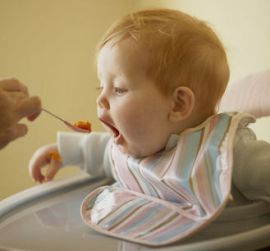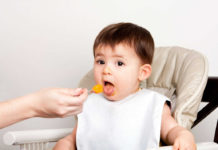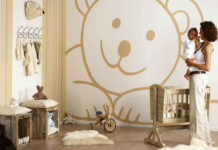 Most of the studies suggest that breastfeeding mothers who eat peanuts and other potentially high allergic foods have a great chance for their children to develop allergy.
Most of the studies suggest that breastfeeding mothers who eat peanuts and other potentially high allergic foods have a great chance for their children to develop allergy.
Also, introducing solid foods to your infant can cause allergy.
When some babies are exposed to certain food proteins, the immune system considers these proteins as invaders and produce antibodies in order to attack those proteins.
These antibodies react in the form of allergy every time your infant consumes the food.
Here are few tips to recognize the food allergy in your infant.
1. It is better to feed your child with one food at a time. Don’t try to attempt any new food for at least three days so that you can observe if there is any allergic reaction. This helps you to recognize which foods are causing the allergic reaction.
2. Observe whether there are any symptoms like sneezing, coughing, vomiting, and swelling of the skin, hives, eczema, and excessive gas. These are the most common symptoms due to foods in your infants.
3. Carefully observe your infant when you are feeding with a new food for the first time. Most of the times, you will observe allergy symptoms within minutes, but some times it takes few hours.
4. Also, observe your baby’s diapers whenever you introduce new foods, because diarrhea is the common food allergy symptom in infants.
5. Immediately contact your pediatrician whenever you notice any signs of food allergies in your infant.
Not only food allergies, but also your infants are more susceptible to develop any type of allergy. Here are some suggestions that can greatly help you in minimizing infant allergy.
1. To wash your baby clothes, use only a laundry detergent without any bleach or perfumes.
2. Make your infant to wear cotton clothes. Don’t allow your child to wear wool or lamb’s wool clothing.
3. Use hypoallergenic child pillows that are not filled with feathers.
4. Don’t allow the pets near your child’s bedroom and also any other cloth toys.
5. Stop spraying the chemicals in your baby’s room.
6. Wash your baby’s hands thoroughly after playing with any other toys.
7. Avoid smoking in your baby’s room and also avoid your child’s exposure to smoke.
Keen observation can help in avoiding the development of infant allergy.














